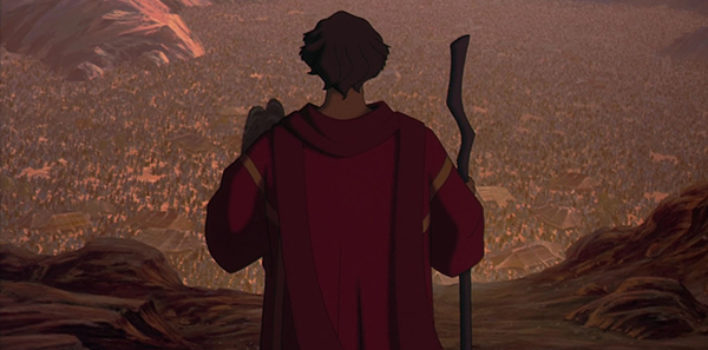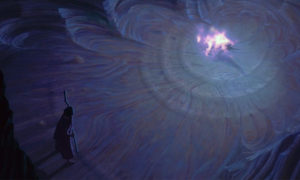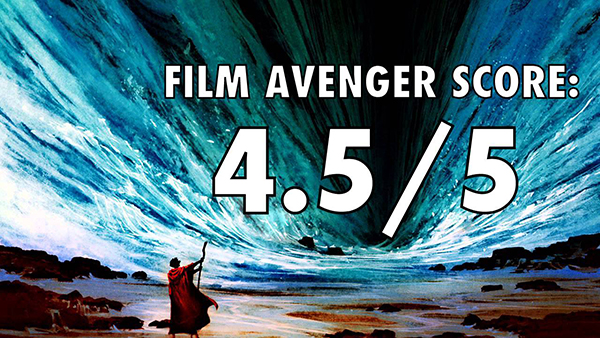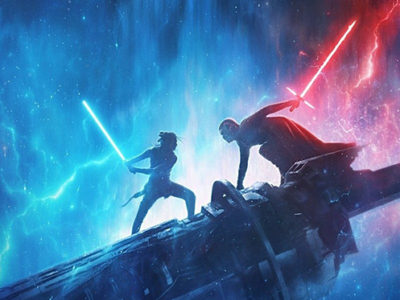Review| ‘The Prince of Egypt’: Respecting the Source
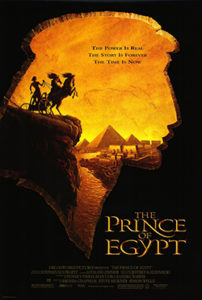 The Prince of Egypt is probably DreamWorks Animation’s greatest film in virtually all respects. Devoid of the sarcasm and modern sensibilities that plague most of their subsequent fare, this movie shows their best storytelling abilities, artistry, and sincerity. A lot of thought was given to this film, and it shows.
The Prince of Egypt is probably DreamWorks Animation’s greatest film in virtually all respects. Devoid of the sarcasm and modern sensibilities that plague most of their subsequent fare, this movie shows their best storytelling abilities, artistry, and sincerity. A lot of thought was given to this film, and it shows.
Fresh from his highly-publicized departure from Disney, DreamWorks Animation co-founder Jeffrey Katzenberg was seeking to make a big splash in the animation industry – beating his former employer at their own game. He succeeded much like Don Bluth did in the 1980s, and like Bluth, this tactical advantage was squandered by poor management and sloppy storytelling.
Specific to DreamWorks’ case, they leaned far too heavily on a cynical edge that gave them some success (Shrek), but degraded the staying power of their films. The Prince of Egypt should have been the template, and instead became the exception.
The film is thematically rich, wonderfully retaining the messages and significance of the Exodus story from Scripture. Its focus on the relationship between Moses and Rameses gives it even more to say. God’s desires for our lives will sometimes come into conflict with those we care about.
This film is beautiful in every sense of the word. Great animated films have the ability to visually tell a story in a way that could not have been done in live action. My favorite animated film, Sleeping Beauty, uses medieval tapestries to form its stylistic palate, with fine details and heavy use of pure horizontal and vertical lines. The dynamic is transferred to everything from the backgrounds to the characters.
In much the same way, The Prince of Egypt uses artistic inspirations like ancient Egyptian art and the color styling of impressionist Claude Monet to inform the art direction. The results are exquisite backgrounds with blended, muted colors – just realistic enough to be believable. Shadow is used well, particularly in the plague montage. The character design has definite flourishes of Egyptian graphics and hieroglyphs, but it is infused with a tangibility and fleshy quality necessary to convey emotion. The characters are also more ethnically correct than they have been in any other interpretation of the Exodus story.
I love how God was presented. The burning bush scene was handled quite well. The power of God is seen as an ethereal mist, which suggests His awe-inspiring beauty and strength that expands and contracts. It’s also clever of the filmmakers to have the voice of God be Moses’ own voice – an interpretation of the “still, small voice” we hear in our heads.
The acting in the animation is wonderful. With few exceptions, the voices are perfect for the characters, and really channel the pathos necessary. But the real stars are the animators, who deliver powerhouse performances, particularly Moses and Rameses. The moves and emotional beats chosen by these “actors with pencils” really give solid, understated, believable performances. One of the best scenes that displays this incredible artistry is when Moses returns to Rameses’ palace to demand the release of the Hebrew slaves.
This is the emotional apex of the film – the relationship of the two brothers reaches its divide. Motivations are clear and the direction conveys the hidden emotions going on in the scene, such as juxtaposing the statue of Seti with Rameses, and Rameses’ lip quiver indicating he has more to say, but holds back. Simply marvelous.
The songs and score work in near-perfect harmony to form the emotional heart of the film. Song composer Stephen Schwartz delivers some amazing work here. Schwartz, a Broadway composer, had previously worked with Alan Menken on the songs for Disney’s Pocahontas and The Hunchback of Notre Dame. So it comes as no surprise that Katzenberg recruited him for DreamWorks’ first hand-drawn feature. The songs are full of emotion, doing what songs in animation should do, which is move the plot forward.
Hans Zimmer gives one of his best scores here. It has influences of regional music, as well as hauntingly beautiful vocal performances. His leitmotif for God’s presence and miracles is one of the best ever done to represent God on film. It’s a simple tune, but can be used to show both meekness and power, just like the Lord Himself.
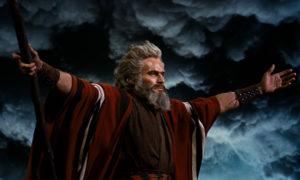 I love the respect that was given by the filmmakers for the Scripture. The old adage “don’t mess with the source material” is on point here. Flourishes were made, but the thematic essence and importance of the story is conveyed beautifully with all the elements. The same cannot be said for Exodus: Gods and Kings, the most recent mainstream filmic take on this sacred story. It was clear with the story choices made for that film that director Ridley Scott did not understand the point of the story itself.
I love the respect that was given by the filmmakers for the Scripture. The old adage “don’t mess with the source material” is on point here. Flourishes were made, but the thematic essence and importance of the story is conveyed beautifully with all the elements. The same cannot be said for Exodus: Gods and Kings, the most recent mainstream filmic take on this sacred story. It was clear with the story choices made for that film that director Ridley Scott did not understand the point of the story itself.
Because of its sincerity and respect toward the source material, The Prince of Egypt is my favorite cinematic version of the Exodus. Given the importance of the central story, comparison to Cecil B. DeMille’s classic The Ten Commandments is inevitable. But, for me, The Prince of Egypt is a superior retelling. It retains the epic quality of DeMille’s film, but conveys the story more succinctly, with less subplots and tangential relationships.
Stuff I Didn’t Like
The film’s streamlining of the plot had its downside. Joshua, an important character in the Exodus narrative, is completely excised from this film and there is no real reason why other than time. It’s possible that the filmmakers wanted to give Aaron more to do, since they had given his herald job to Moses. Joshua was even there when Moses received the Ten Commandments on Sinai.
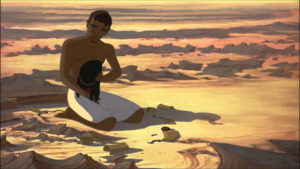 The Ten Commandments scene itself was far too short and had little explanation, relying instead on the audience’s familiarity with the story. This is the only area in which DeMille’s interpretation is a bit better. The Ten Commandments is an important aspect of the Exodus story, if not THE most important (though I understand that it doesn’t make much sense for the brother-against-brother core of Prince of Egypt). The narrative could have gone on for fifteen more minutes to have a scene with God carving the tablets and talking to Moses – forming a proper epilogue.
The Ten Commandments scene itself was far too short and had little explanation, relying instead on the audience’s familiarity with the story. This is the only area in which DeMille’s interpretation is a bit better. The Ten Commandments is an important aspect of the Exodus story, if not THE most important (though I understand that it doesn’t make much sense for the brother-against-brother core of Prince of Egypt). The narrative could have gone on for fifteen more minutes to have a scene with God carving the tablets and talking to Moses – forming a proper epilogue.
There is one song that takes away from the story. The entire “Playing With the Big Boys Now” scene and song is out-of-place thematically and stylistically. There is really no need for it. It doesn’t have the epic quality and timelessness the other songs have. It’s too showy, too “Broadway.” Steve Martin and Martin Short’s performances don’t make it any better. I don’t mind them, as their priest characters are in the background most of the time. But when they are center-stage, as they are during this song, it’s apparent that they were not the best choice for these characters. The point of the scene, the snake miracle, could have been done without a song.
Stuff to Ponder
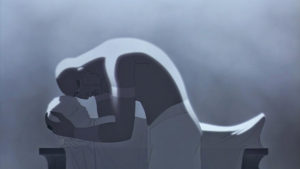 The Book of Exodus is a powerful story within God’s larger story of His relationship with us. In The Prince of Egypt, the relationship between the two brothers – Moses and Rameses – is at the center of the story. Moses and Rameses loved each other as brothers do. But Moses’ righteous path ordained by God puts him in direct conflict with Rameses’ arrogance, and the bond is broken. The relationship between these two men says a lot about the nature of men generally, as well as the relationships we have with others.
The Book of Exodus is a powerful story within God’s larger story of His relationship with us. In The Prince of Egypt, the relationship between the two brothers – Moses and Rameses – is at the center of the story. Moses and Rameses loved each other as brothers do. But Moses’ righteous path ordained by God puts him in direct conflict with Rameses’ arrogance, and the bond is broken. The relationship between these two men says a lot about the nature of men generally, as well as the relationships we have with others.
“I am Egypt – the morning and the evening star. If I say day is night, it will be written. And you will be what I say you are…” -Rameses
Compared to both previous and more recent cinematic incarnations, Rameses is a very compelling character in this film. As in the Bible, his actions mirror man’s sinful nature. Rameses believes he is a god, the “morning and evening star.” What the actions taken by God against Rameses, including the plagues, teach is that we may think that we have power, but compared to the power of God we have nothing.
As the Red Sea collapses inwards, and his army is engulfed by the water, Rameses stubbornly tries to stand in defiance of the power of God. He ends up being wiped out on the shore from the force of the waves. Man is always tempted to think he has power over things over which he actually has no control. It’s as futile as standing on the beach and telling the waves to stop lapping on the sand.
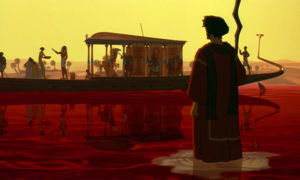 Unlike Rameses, Moses understands that he does not have control, and relies on God’s power to perform miracles and do what must be done to free the Hebrews from bondage. This reliance on God proves even more important for Moses on a personal level, as Rameses does not yield even to God. Moses is forced to accept the rift between himself and his brother.
Unlike Rameses, Moses understands that he does not have control, and relies on God’s power to perform miracles and do what must be done to free the Hebrews from bondage. This reliance on God proves even more important for Moses on a personal level, as Rameses does not yield even to God. Moses is forced to accept the rift between himself and his brother.
“I have not come to bring peace, but a sword. For I have come to turn a man against his father, a daughter against her mother, a daughter-in-law against a mother-in-law – a man’s enemies will be the members of his own household.” -Matthew 10:34-36
Like Moses, our devotion to the Lord will come into conflict with people we know, even members of our own family. In the above passage, Jesus talked about this, quoting the Book of Micah. It wasn’t meant to be vengeful or done out of malice. It is merely the truth. People we know will disagree with what we believe. It is up to us to pray for them and help them find God.
So What I’m Trying to Say is…
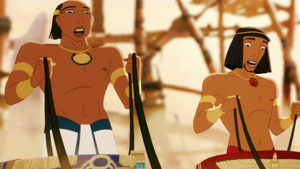 The Prince of Egypt represents the wondrous capabilities of animation as an storytelling art form. Its art direction, character design, musical score and animation all work together wonderfully. The performances are compelling and full of emotion, and the filmmakers do the source material a great service with their obvious reverence and respect.
The Prince of Egypt represents the wondrous capabilities of animation as an storytelling art form. Its art direction, character design, musical score and animation all work together wonderfully. The performances are compelling and full of emotion, and the filmmakers do the source material a great service with their obvious reverence and respect.
Like all stories in the Bible, the Book of Exodus teaches us about God’s character and His relationship with us. We must realize that, when compared to God, we are powerless – even against our own sin. It should make us even more grateful to have a God who is merciful and loving. But yielding to that power takes not just humility, but courage. For God’s will inevitably comes into conflict with the sinful desires of men, which will cause divides in our own homes.
As of this post, The Prince of Egypt is currently streaming in HD on Netflix, and it looks glorious. I really hope DreamWorks Animation gives the film the Blu-ray treatment it deserves soon.


